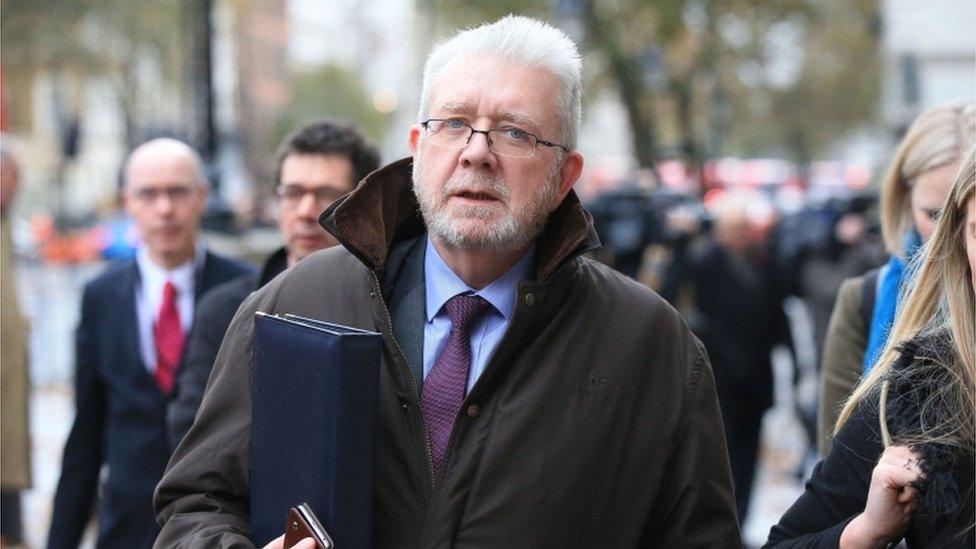FMQs: The generic and the particular
- Published
Kezia Dugdale said Elaine Hanby's condition affects the quality of her life
The political world is an uneasy amalgam of the generic and the particular. Frequently, the two overlap. Frequently, as at Holyrood today, they interact jarringly.
Almost by definition, political promises are generic. Last May, parties did not produce a manifesto for each individual in Scotland - although it would be hugely amusing had such an event occurred.
"Jack, this is your manifesto. Jill, here's yours - don't worry about the bit on Page 94, it doesn't apply to Dundonians who were born in April."
Even then the voters - gloriously curmudgeonly as ever - would say: "Aye, but what's in it for me, eh? That's what I want to know."
No, political pledges have to be wide-ranging. In essence, party leaders are doing a sum.
How many people (X) will this impress?
How many people (Y) will this annoy?
Is X - Y still sufficiently positive to give me a fighting chance?
(**Sometimes, of course, parties seem disarmingly blithe and insouciant about the X to Y ratio. There is a name for such parties. They are called losers.)
But back to our uneasy amalgam. Frequently - third use which itself counts as frequent - opposition leaders will seek to challenge the generic by resort to the particular. Both Ruth Davidson and Kezia Dugdale deployed such tactics today.
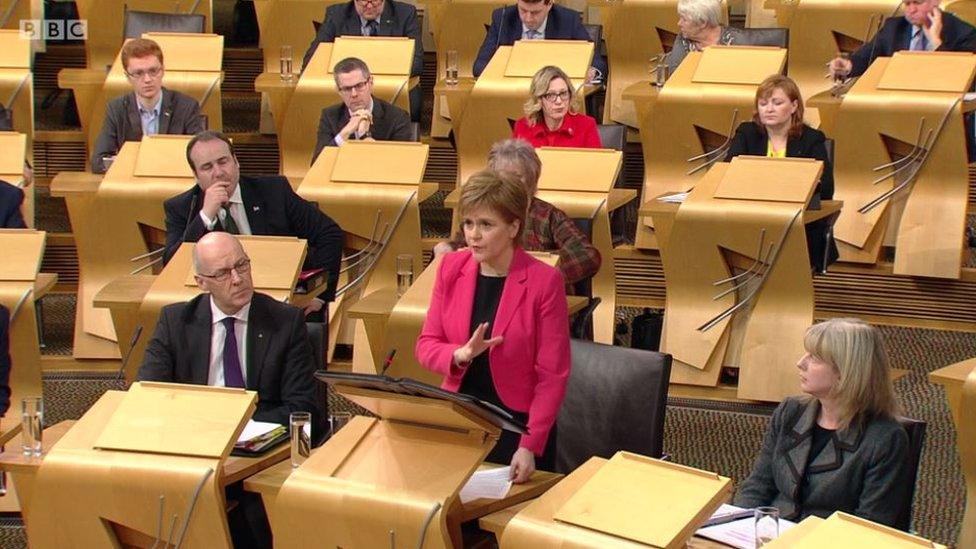
Nicola Sturgeon had to come up with generic answers to specific questions at Holyrood
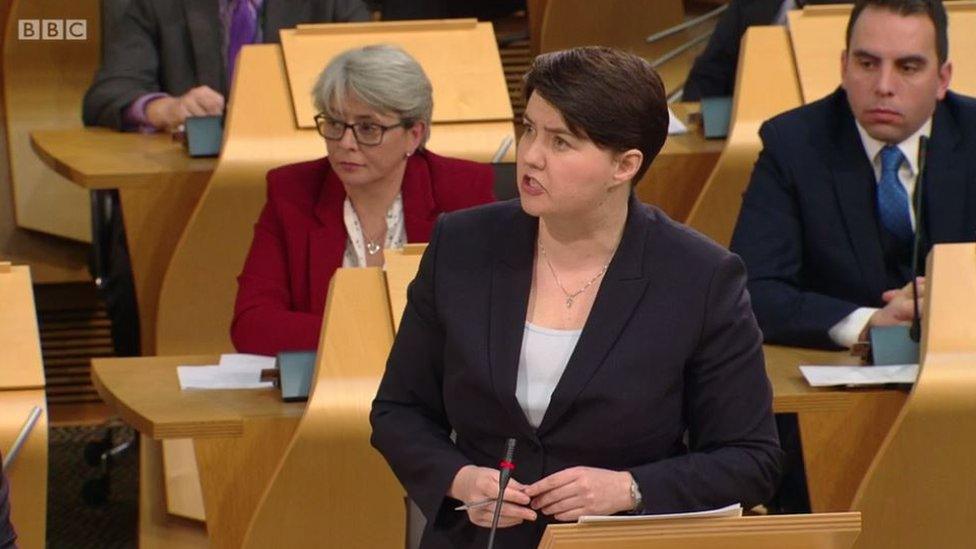
Ruth Davidson led her questioning on business rates
For the Tories, Ms Davidson cited two companies which are concerned at potential increases in their business rates bill. She pursued the point rather effectively.
Inevitably lacking detail on the individual cases, Nicola Sturgeon was obliged to resort to the general: there was a revaluation under way by an independent assessor; there was a right of appeal; and, in any case, the Scottish Government had provided the most competitive business rates regime in these islands, including full exemption for 100,000 small firms.
The two leaders were thus talking different languages. Generic and particular. Cobol and Fortran (it's a long time since I first encountered computers). French and Klingon (actually, those will be the two official languages in the EU after Brexit).
Ditto with Labour's Kezia Dugdale who raised the case of a Nairn woman and her wait for an operation. Again effective, as Ms Dugdale iteratively ramped up the complaints. At Ms Sturgeon's side, the Health Secretary Shona Robison looked rather exasperated.
Once more, inevitably, the FM had to resort to a generic defence.
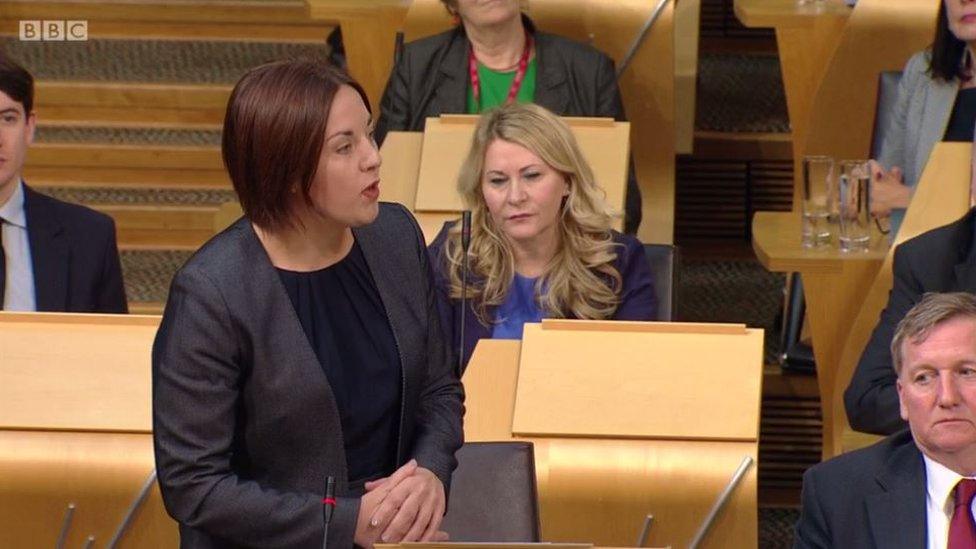
Kezia Dugdale raised the case of a Nairn woman who has had a lengthy wait for an operation
Then to the two recurring leitmotifs in the Scottish symphony. Brexit and budget. Patrick Harvie of the Greens contrived rather deftly to raise both.
Firstly, he described the Prime Minister's Brexit speech on Tuesday as "dangerous" and urged the FM to keep open the option of an independence referendum.
Not that Ms Sturgeon needed urgin'. She said the PM must understand that Scotland voted to remain in the EU (and thus the single market) - and that Scotland's wishes must not be simply disregarded.
The FM said Scotland must be enabled to choose - if the PM would not respond to demands for distinctive Scottish treatment. And she characterised such a choice as "looming." Time, she added, was fast running out for the UK government to convince the people of Scotland that their interests were being seriously considered.
Strong stuff - although arguably not any stronger than the comments she made in an interview with me on Tuesday, immediately after the Brexit speech. As I noted that day, I believe that this week's events bring indyref2 measurably closer.
Still no decision - nor will there be for some time. Still no date. Although Alex Salmond believes that autumn 2018 looks likely. Mr Salmond is an astute observer of Scottish politics.
Differentiated deal
For now, the Scottish government is intent on pursuing the prospect of distinctive Scottish treatment within the overall UK approach. They did so today in discussions with the UKG and other devolved administrations.
To be absolutely clear, this has been the approach of the SG from the outset: they always placed the Scottish request in the context of bargaining conducted by the UK as the departing member state.
Why pursue that? Why, when the PM's speech stressed pan-UK objectives and aims? Why, when the Scottish Secretary says he sees no evidence that would justify distinctive Scottish treatment?
Two reasons, as billed here umpteen times before....
They are genuinely seeking to advance Scottish interests - including the repatriation of powers to Scotland, and not solely the UK, in the event of Brexit.
Scottish ministers want to demonstrate to the people of Scotland that they exhausted every potential negotiating standpoint, that they dealt at length and in depth with the UK government and did not jump straight to indyref2.
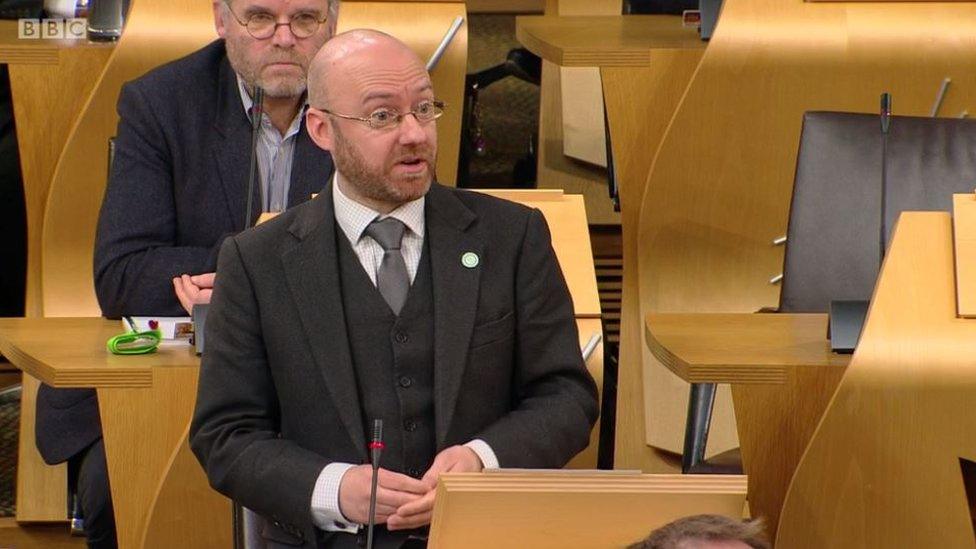
Patrick Harvie asked questions about Brexit and the budget
Back to questions. Patrick Harvie moved from Brexit to budget. The current proposals, advanced by the Finance Secretary Derek Mackay, would not do. Up with it they would not put.
In particular, they wanted movement on taxation as well as spending. In essence, they want a heavier burden placed upon higher earners than is currently contemplated within Mr Mackay's plans.
Keen followers of this unfolding soap will recall that Derek, the cool hero with the dry wit and the calculator, needs a chum. Will it be Patrick, the droll, bearded environmentalist? Or Willie, the no-nonsense Fifer with the winning smile who carries sacks of coal up hills for a hobby?
Only this morning, Willie (Rennie, that is, of the LibDems) set out his terms. He favours a tax increase. We know he does. He said so in his manifesto.
But the latest shopping list lays much more emphasis on spending switches; favouring education, mental health, police and transport to the Northern Isles (That last bit no doubt courtesy of Willie's own chums, Tavish and Liam McArthur).
Right now, the sun seems to be shining on Willie. Derek and his pals have never quite forgiven Patrick for a row over an earlier putative budget deal. (Series 3, episode 7). And they'd rather talk spending than tax.
But we're not there yet. Keep watching. Every twist, turn and hypothecated local authority settlement.
- Published19 January 2017
